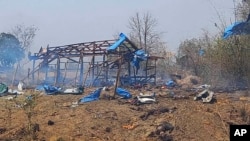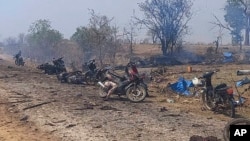Myanmar's government in exile is working to establish air defense warning systems for the public after the bombing of a village in the central part of the country killed nearly 200 civilians, including 38 children, 10 days ago, a top official of that government told VOA this week.
"It is essential for us to find ways to stop the Myanmar junta's deadly airstrikes on civilians," National Unity Government Human Rights Minister Aung Myo Min told VOA.
"We will work to establish air defense warning systems for the public," Aung Myo Min said.
"We have to convey the importance of this to the international community. We must have an 'air signal system' that can warn people. The Burma Act under the 2023 NDAA [U.S. National Defense Authorization Act] calls for nonlethal assistance, so we need to include such things."
About 300 people had gathered outside the village of Pazigyi, Kanbalu township, in Sagaing region, early on the morning of April 11 to commemorate the opening of a small local NUG administrative office when Myanmar army aircraft bombed the location, witnesses told VOA.
There were more than 200 houses in the village. Villagers, mainly poor subsistence farmers, also pan for gold in nearby rivers. Like much of Sagaing, Pazigyi was not under military junta control and villagers strongly supported the NUG.
"At least 170 people, including 24 women and 38 children, were killed after the military junta bombed Pazigyi village on April 11," Bala Gyi, a first responder of a local aid group, told VOA three days after the attack. VOA could not independently verify the numbers of dead from the bombing.
In addition, 30 people were wounded, 20 of whom remain in serious condition, including a pregnant woman and an 8-year-old child. Of those who died, 171 bodies have now been cremated, Bala Gyi said.
He also said it was the first airstrike in Kanbalu township. He said that since there had not been previous strikes in the area, Pazigyi villagers did not think they were in danger of being bombarded.
"From my experience with recovering dead bodies," he said, "the condition of these bodies was very bad. … There were bodies blown to pieces. In some cases, the bodies had been completely crushed. We collected the bodies and pieces and burned them over the next three days."
Junta spokesperson Major General Zaw Min Tun confirmed the attack but blamed opposition forces for the deadly outcome.
UN demands accountability
The United Nations and Western governments, as well as the foreign ministers of the Group of Seven leading industrialized countries, have all expressed outrage over these latest attacks on civilians, condemning Myanmar's ruling junta for carrying out the air raid, and demanding accountability for those responsible.
Washington said it was "deeply concerned" about the airstrikes. "These violent attacks further underscore the regime's disregard for human life and its responsibility for the dire political and humanitarian crisis in Burma following the February 2021 coup," State Department spokesperson Vedant Patel said in a statement, using the country's former name.
U.N. Secretary-General Antonio Guterres "strongly condemns the attack by the Myanmar Armed Forces," according to a statement by his spokesperson Stephane Dujarric. Guterres "reiterates his call for the military to end the campaign of violence against the Myanmar population throughout the country," the spokesperson noted.
U.N. High Commissioner for Human Rights Volker Türk said on April 11 he was "horrified" by the deadly airstrike, which he said killed schoolchildren who were in the middle of a dance performance.
Aftermath of attacks
Ye Naing, a 31-year-old man who lost seven of his relatives, including his parents and his youngest daughter, recounted his horrific experience to VOA by phone April 14, three days after the attack.
"I was volunteering for an opening event for the NUG office in the administrator's new house. My family was outside, and I went into the office alone for a while around 8 a.m. I was on my phone when I heard a loud noise at around 8:15. I didn't know what had happened. The whole area was covered in smoke. I couldn't see anything at all.
"I began running around hysterically looking for my youngest daughter and my mother and father. Everything was a big pile of ashes. There were dismembered bodies everywhere. I saw my father's body cut in half. His lower body was still there, but the upper half was missing. I couldn't find my mother and daughter at all. The bombs killed almost everyone. There were so many dead bodies.
"While we were frantically searching for family members among the dead bodies, a military helicopter flew over and fired at us with a machine gun from above. We tried to run and hide under a bridge. With my own eyes, I saw a woman who could not run away in time as her chest exploded from the gunfire.
"My daughter, Hnin Yu Wei, was only 3 years old," Ye Naing said. "She had gone outside to eat with her grandmother. They still haven't found their bodies.
Zaw Min Tun had accused local People's Defense Forces, or PDF, of having landmines, but Ye Naing denied that was the case.
"There were no weapons in the building," Ye Naing said. "The bombs fell and exploded, killing the people, including so many children. If weapons in the office had caused the explosion, as the military said, I would have died first. There were no landmines. There were no bombs. We didn't have any weapons."
According to Bala Gyi, there are local defense groups in Pazigyi village but their weapons are handmade hammers; there is no well-armed force. He said there was never a case of landmines being used when the columns entered the villages. There are no mines at all.
Zaw Min Tun justified the Pazigyi airstrike, saying the explosions were "not because of our attacks. Around there, terrorist NUG and its armed group, PDF, were operating. We received specific information that the weapons we fired hit the area where the PDF teams were storing weapons and ammunition which exploded, causing the deaths."
Administrators killed
At least three members of the NUG-appointed administration were targeted and killed in the attacks," including U Maung Oo, the chief administrator for Pazagyi village," said first responder Bala Gyi. VOA could not independently verify this.
"I think there were informants that tipped off the army about the meeting," he said.
After the military coup the junta appointed an administrator for the village who was later killed by local defense forces in March 2022. "This area had never fully been under the control of the junta, that is another reason why they attacked here," Bala Gyi said.
"Attacking a place like this with the most powerful weapons in a country's military is surely intended to mass murder an entire population," Nyi Thuta, a military captain who defected, told VOA via Zoom.
"The weapons used now are weapons used in conventional warfare. Normally, a bomb will affect an area of around 200 to 400 square meters," Nyi Thuta said. "Now, the area where the incident occurred in Pazigyi village is an area of about 400 meters. The people there were in no position to escape from being hit by the bomb. Should such strong weapons be used against the public? It is not an act in accordance with the honor of the military."
Calling for help
Survivor Ye Naing called for international action, a sentiment echoed by first responder Bala Gyi.
"I want the international community, including the [U.N.] Security Council, to take effective action," Bala Gyi said. "I am 28 years old. I have never seen such brutal killing. Women, children, even 6-month-old baby are being killed. How long will the people be oppressed? I want to ask the world how long it will take to make them stop committing war crimes."
The NUG's Aung Myo Min said the outside world also must go beyond its current sanctions against the junta, including a jet fuel embargo against the Myanmar junta by the U.S., the EU, and Britain.
This sort of attack shows that the sanctions are not enough, he said.
"We must ask the international community to cut off the supply lines that are supporting the junta so that these terrorists cannot continue to carry out such horrific attacks," he told VOA.





